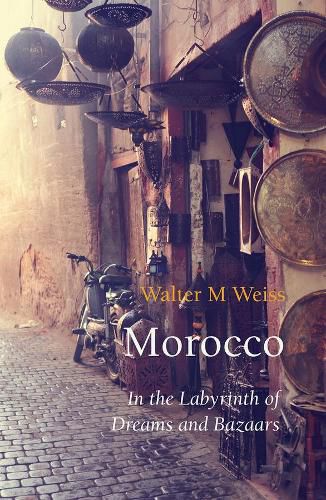Readings Newsletter
Become a Readings Member to make your shopping experience even easier.
Sign in or sign up for free!
You’re not far away from qualifying for FREE standard shipping within Australia
You’ve qualified for FREE standard shipping within Australia
The cart is loading…






While much of the Middle East is now engulfed in conflict and repression, Morocco remains a curious anomaly: peaceful and open to the West, it has provided refuge for artists and writers for generations, and it remains an exotic destination for many curious travelers. The country has been influenced by an incredible variety of peoples-Phoenicians, Romans, Arabs, Berbers, Muslims, Jews, and most of Europe’s colonizers have played a role-and modern Moroccan society is no less rich and varied.
In Morocco, Walter M. Weiss brings extensive knowledge of the region to bear as he travels the breadth and depth of the country’s social and geographical contrasts. Berber villagers of the mountains are for the most part still illiterate and consider their king to be divinely chosen, while businessmen in Casablanca’s towering offices dream of closer ties to the European Union. Weiss visits the settings of modern legends, such as Tangier, as well as the two medieval centres Fes and Meknes, and sees earthen kasbahs and Marrakech’s bazaar. On the way, he meets acrobats, Sufi musicians, pilgrims, craftsmen, beatniks, rabbis, and Berber farmers-a kaleidoscope of variety and cultural influence.
$9.00 standard shipping within Australia
FREE standard shipping within Australia for orders over $100.00
Express & International shipping calculated at checkout
While much of the Middle East is now engulfed in conflict and repression, Morocco remains a curious anomaly: peaceful and open to the West, it has provided refuge for artists and writers for generations, and it remains an exotic destination for many curious travelers. The country has been influenced by an incredible variety of peoples-Phoenicians, Romans, Arabs, Berbers, Muslims, Jews, and most of Europe’s colonizers have played a role-and modern Moroccan society is no less rich and varied.
In Morocco, Walter M. Weiss brings extensive knowledge of the region to bear as he travels the breadth and depth of the country’s social and geographical contrasts. Berber villagers of the mountains are for the most part still illiterate and consider their king to be divinely chosen, while businessmen in Casablanca’s towering offices dream of closer ties to the European Union. Weiss visits the settings of modern legends, such as Tangier, as well as the two medieval centres Fes and Meknes, and sees earthen kasbahs and Marrakech’s bazaar. On the way, he meets acrobats, Sufi musicians, pilgrims, craftsmen, beatniks, rabbis, and Berber farmers-a kaleidoscope of variety and cultural influence.